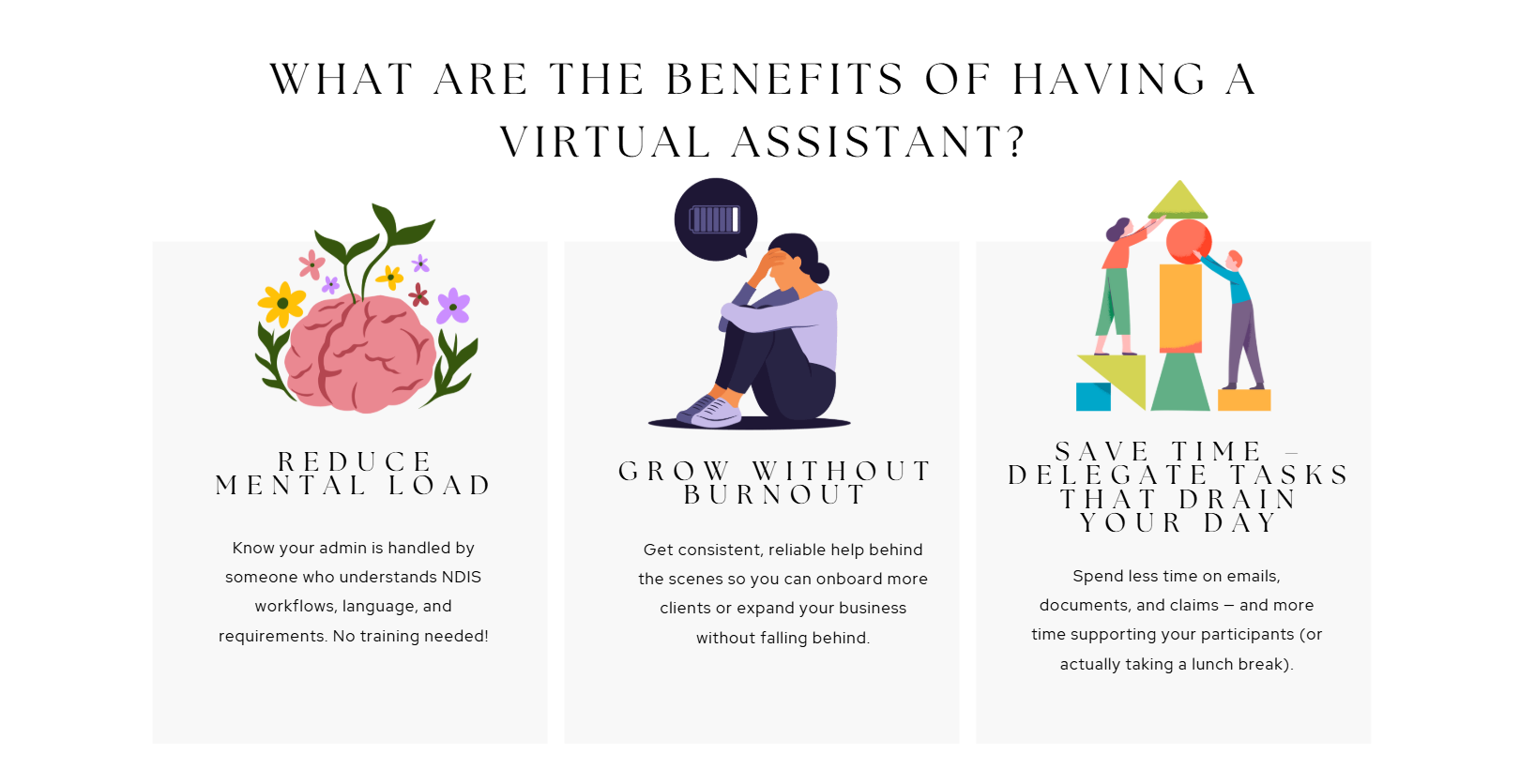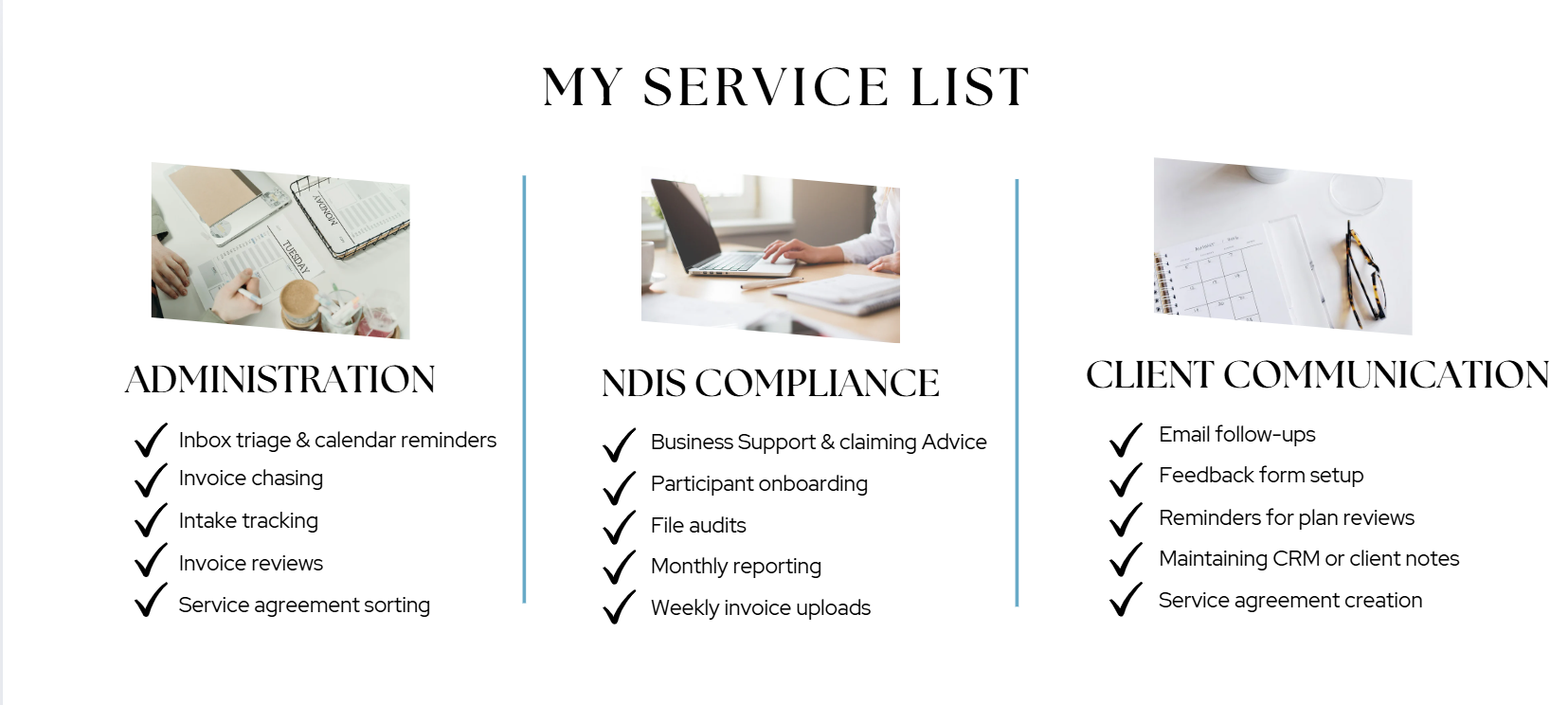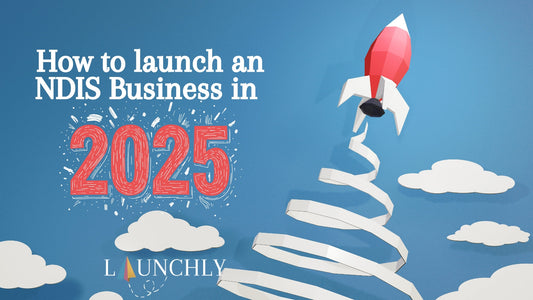Welcome to the NDIS Community
Let's go!
-

NDIS Service Agreement templates
NDIS service agreement templates
Plan your new business!
-
Free Step-by-step guide to becoming an NDIS provider
Regular price $0.00 AUDRegular priceUnit price / per -
NDIS Sole Trader Client and business bookkeeping google sheet template
Regular price $25.95 AUDRegular priceUnit price / per -
NDIS Business Start up Checklist Template
Regular price $9.95 AUDRegular priceUnit price / per -
NDIS Business Plan - Minimalist Template
Regular price $9.95 AUDRegular priceUnit price / per
Get Organised!
-
Short Term Accommodation Service Agreement Template
Regular price $22.95 AUDRegular priceUnit price / per -
Consent to Administer Medication Template
Regular price $9.99 AUDRegular priceUnit price / per -
Participant Support Plan Template
Regular price $22.95 AUDRegular priceUnit price / per -
Behaviours of concern (Star Chart) Template
Regular price $12.95 AUDRegular priceUnit price / per
There is a lot of free knowledge here!
Browse below to learn more about your NDIS industry
NDIS Pricing Guide Overview 💡
Maximum Price Limits
The NDIS sets maximum price limits for different support categories. These limits ensure that participants receive fair pricing for services, and providers must not exceed these caps if they are billing to Plan Managers or Directly to the Agency. If you bill above the NDIS pricing arrangements, you will need to follow up with the client for the gap payment.
The maximum pricing limits apply to Agency and Plan Managed participants.
Self Managed participants are able to pay for services beyond the pricing limitations, however, it is important to discuss the rates with your clients first.
View the NDIS Pricing Arrangements here
Regional Variations
The price limits may vary depending on location (metropolitan, remote, or very remote areas), considering the costs of providing services in different regions.
Service rates will be calculated in accordance with the Participant's NDIS-registered residential address.
Search your clients area here
Price Reviews
The NDIS Pricing Guide is updated regularly, with prices reviewed to reflect changes in market conditions, inflation, and participant needs. Providers must stay up-to-date with these changes to ensure their rates remain compliant.
Short Term Accommodation services
Please note that in accordance with the new NDIS legislations, NDIS participants need to be specifically approved for 1:1 Short Term Accommodation service.
If your client does not know if they are approved for a specific ratio of STA (Short Term Accommodation), there is a good chance that they may not be approved for this type of support.
To avoid not being paid for your services, it is important to check in with their Plan Manager to check if they are eligible before the STA service has been provided. You can do this by sending them your service agreement - This ensure your STA services are compliant and your client is funded for the ratio you intend to bill.
Some plan managers may request the following information to assess service claimability:
- A service agreement
- A schedule of supports (this ensures that no 'out' activities are being claimed)
- Accommodation receipts (remember, only the participants accommodation can be claimed)
- Location of the STA (it will be worth checking what their plan manager considers a reasonable distance)
-Other information, such as, if the cost of food and travel was included in your STA invoice (travel to and from the STA cannot be claimed)
Participants living alone or receiving Support Independent Living Supports are not eligible for STA services.
Let's break this down
Are you up to date with the new Oct 24 Legislation?
What can be claimed?
- Accommodation assistance or tenancy
assistance
- Must be approved in the plan
- Assistance animals
- NDIS PLANNER approval required
- Assistance with daily life tasks in a group or shared living arrangement
- SIL - must be specifically funded and billed at weekly rates OR hourly supports. Cannot be billed as both
- Assistance with travel or transport
arrangements
- must be specifically funded in the plan
- If this has been directly funded by the agency (fortnightly payments) this cannot be claimed from a plan manager *provider travel is excluded from this support category
- Community nursing care
- Daily personal activities
- not always funded in PACE plans or young children plans
- Social, community and recreational activities
- not always funded in PACE plans or young children plans
- Group and centre based activities
- Must be billed in group ratios and be disability specific
- Consumables
- dependent on what has been approved by the planner and must be disability specific and adapted
- meal preparation and delivery
- must be approved in the plan if your are providing "take away" services. As in delivering ready made meals such as Lite n Easy. If you are delivering the support in the clients home (cooking and packaging the food at the clients house) you can bill this from the core supports and does not require approval.
- house or yard maintenance
- usually anyone above 18 with a daily activities budget can claim this service
- cleaning
- usually anyone above 18 with a daily activities budget can claim this service
- Laundry Services
- Take away laundry services must be approved. In home laundry services can be billed from domestic assistance
- Support coordination
- must be included in the plan. This service cannot be billed from any other category.
- Capacity Building & Therapeutic supports
- Skill development services must be working on building skills and may require an end of plan report
- services performed by an allied health therapist. These services can only be billed from the Capacity Building budget and is sometimes a stated support in the plan
**** It is important to note that sometimes participants are not aware of the types of supports they have been approved for. This is because of the way their plan documents are written. Ensure that your clients reach out to NDIS to confirm what they are approved for before beginning services or send a Service Agreement to their Plan Managers to confirm funding availability. ****
Find the full list HERE
What Can't be claimed?
- Living & Household
- Rent, mortgage, strata fees, bonds, utilities
- Furniture, appliances, and home improvements not related to disability
- General maintenance (gardening, fencing, repairs)
- Financial & Legal
- Donations, fines, insurance, superannuation, legal costs
- Education tuition, business setup, and debts
- Gap payments for Medicare or private health
- Food & Groceries
- All groceries, cleaning products, takeaway meals
- Food delivery platforms unless itemised for support purposes
- Lifestyle & Recreation
- Smoking, alcohol, gambling, dating services
- Sports, gym (including personal training), streaming, music, travel, theme parks
- Events (e.g. weddings, funerals, concerts)
- Beauty & Clothing
- Haircuts, makeup, cosmetic procedures
- Clothing, jewellery, beauty treatments
- Travel & Transport
- Holidays, flights, vehicle purchases, petrol, e-scooters
- Travel for children or non-disability-related needs
- Pets
- Non-assistance animal care: food, vet bills, insurance, grooming
- Reproductive & Family
- Fertility treatments, surrogacy, child support fees
- Babysitting, family therapy, parenting programs
- Not Evidence-Based / Alternative
- Crystal therapy, reflexology, sound therapy, tarot
- Reiki, energy healing, shamanic practices
- Life coaches, yoga therapy, hypnotherapy
- Massage Therapy (not performed by an Allied Health Professional)
- General & Mental Health
- Diagnosis/treatment of health conditions
- Prescription & non-prescription meds
- Hospital or outpatient services
- Mental health residential care, addiction treatment
- Children & Education
- School/daycare tuition, uniforms, transport, aids
- Teaching aids, tutoring, excursions
- Homeschooling costs, school refusal programs
- Higher Education & Employment
- University/VET fees, assistive tech, textbooks
- Work equipment, reasonable adjustments
- Government employment programs, transport for work
- Housing & Infrastructure
- Housing deposits, social housing upgrades
- Crisis or emergency housing
- Infrastructure upgrades for public or transitional housing
- Transport Systems
- Public transport fares or concessions
- Taxi or bus modifications
- Community transport not disability-related
- Justice, Aged Care & Legal
- Secure accommodation, court reports
- Residential aged care fees or supports
- Supervision or monitoring for justice system purposes
- Illegal or Restricted
- Illegal products, firearms, and seclusion rooms
- Non-compliant modifications (vehicle/home)
- Prohibited restrictive practices
Find the full list HERE
- Finance and payments related
Claiming Allied Health Therapies from Core
Why Allied Health Therapies Can’t Be Claimed from Core Supports
Allied Health services such as occupational therapy, speech therapy, physiotherapy, and psychology are considered therapeutic supports under the NDIS. These must be claimed from the Capacity Building – Improved Daily Living budget, not from Core Supports.
Claiming therapy from Core funding is not permitted because:
- core supports are intended for everyday support needs (e.g. personal care, community access, consumables).
- involves clinical, therapeutic, or professional expertise, which falls under specialised support categories.
- non-compliant claims, rejected invoices, or issues during an audit.
***Core allied health therapy lines are due to be removed June 30, 2025***
Tip: Always check the participant's plan to see if Capacity Building funds are available.
IMPORTANT! Claiming STA services in 2025
Please note that in accordance with the new NDIS legislations, NDIS participants need to be specifically approved for 1:1 Short Term Accommodation service.
If your client does not know if they are approved for a certain ratio of STA (Short Term Accommodation) there is a good chance that they would not be approved for this type of support.
To avoid not being paid for your services, it is important to check in with their Plan Manager to check if they are eligible before the STA service has been provided.
Some plan managers may request the following information to assess claimability:
- A service agreement
- A schedule of supports (this ensure no 'out' activities are being claimed'
- Accommodation receipts (remember, only the participants accommodation can be claimed)
- Location of the STA (it will be worth checking what their plan manager considers a reasonable distance)
-Other information, such as, if the cost of food and travel was included in your STA invoice (travel to and from the STA cannot be claimed)
Participants living alone or receiving Support Independent Living Supports are not eligible for STA services.
***STA claims are taking a significant amount of human review with Plan Managers. Please except a lot of time and a lot of questions in order to get your claim paid. Prepare accordingly for this delay. ***
Steps to pre prepare for your claim:
- Ask for funding confirmation from the clients plan manager before the STA service starts
- Ensure that the client knows what ratio they are funded for
- Ensure that yours services do not include activities or items on the 'out' list
- Ensure you have a roster/schedule of supports completed
- Know what can and cannot be claimed for if providing 1:1 STA services
How to Set Competitive and Compliant Rates 💰
Stay Within Price Limits
To stay competitive, ensure your rates are within the NDIS maximum price limits.
Charging above these limits will not be honoured unless your client is a Self Managed participant (and your rates have been negotiated and agreed upon),
Charging over the price limits can force your client's Plan Manager to short pay your invoice as they are not permitted to pay anything above the price limits set out in the pricing arrangements.
View the NDIS Pricing Arrangements here
Consider Your Service Area
If you're operating in a remote or very remote area, you may be eligible to charge higher rates, as outlined in the NDIS Pricing Guide. Make sure you're aware of these regional variations and adjust your rates accordingly.
The participant will need to be listed in the remote area in their NDIS plan in order to be able to claim the higher remote rates.
Search your clients area here
Evaluate Your Business Costs
Consider your business expenses, including staffing, travel, equipment, tax & super obligations, and administration. Ensure your rates cover these costs while remaining within NDIS limits.
Find our start-up calculator here
Transparent Communication with Participants
When discussing rates with participants, be clear about how your pricing aligns with NDIS guidelines. Transparency builds trust and helps participants understand the value they’re receiving. Ensure you have a foolproof service agreement for short notice cancellations and service exit.
Marketing Your NDIS Services 🕵️♀️
Highlight Competitive Pricing
Use your understanding of the NDIS Pricing Guide to show how your rates are competitive and compliant. In your marketing materials, emphasize your fair pricing and commitment to offering quality services within NDIS guidelines.
Focus on Value
Participants often choose providers based on perceived value. Ensure your marketing highlights not only your rates but also the quality of your services. Showcase testimonials, success stories, your qualifications/experience or case studies that demonstrate the real-world impact of your work.
Leverage the Launchly Provider Directory
Being listed in a directory like Launchly allows participants to easily find your services. Ensure that your pricing and service offerings are clearly stated in your listing so participants can compare and understand the value you provide.
Promote Specialisations
If you specialise in certain services (e.g., therapy, assistive technology, or support coordination), make sure to highlight these in your marketing. Tailor your message to showcase why your expertise justifies your rates within the NDIS framework.
Offer Transparency in Advertising
Be upfront about your rates in your marketing materials, including on your website and in service listings. This openness helps participants compare providers and builds confidence in your services.
It's important to remember that if you provide a service that is not claimable against the NDIS and your advertising claims 'NDIS funded', there could be serious consequences for you and your business, including hefty fines and NDIS bans. Ensure that your services are claimable against NDIS funds.
Check out the IN's & OUT's list HERE
FAQ for Providers 💭
Do I need to be registered to provide NDIS services?
There has been some talk about NDIS introducing registrations. As of right now, no, not all providers need to be registered. You can offer services as an unregistered provider if you are delivering services to self-managed or plan-managed participants unless you are providing Behaviour Support Therapies or Restrictive Practices.
However, if you want to provide services to agency-managed participants, you must be a registered NDIS provider.
What types of insurances do I need as an NDIS provider?
As an NDIS provider, you’ll need:
- Public Liability Insurance: To cover damages or injuries that may occur during service delivery.
- Professional Indemnity Insurance: To protect against claims of negligence or professional errors.
- Workers’ Compensation Insurance: Required if you have employees.
Having these insurances ensures your business is protected and compliant with NDIS standards.
Do I need NDIS Worker Screening?
Yes, all workers providing services directly to participants must undergo NDIS Worker Screening to ensure they are suitable to work with people with disabilities. This applies to both registered and unregistered providers.
NDIS Worker Screening (Yellow Card)
How often do I need to update my policies and procedures?
Policies and procedures should be regularly reviewed and updated to stay compliant with NDIS Practice Standards. It’s a good idea to review them annually or whenever there are significant changes to the NDIS framework/legislations or your business operations.
What do I do if the Plan Manager won't pay?
Usually, this is because the client is not funded for the specific support that you are providing. It is important to check in with your client and check their funding type.
It is okay to ask them for a copy of the plan, however, they are not obligated to provide that information.
OR
You've formatted your invoice incorrectly.
The solution? Draw up a service agreement and confirm available funding against the NDIS line item services you wish to provide.
Did you know? We offer service providers Virtual Assistant services to ensure you invoices are compliant and payment ready.
Click here for Virtual Assistant services
Check out service agreement templates here
Handy Links to help you along the way
NDIS Links
Changes to the NDIS Legislation
NDIS Pricing Arrangements
Supports Funded by NDIS
NDIS Worker Training Modules
NDIS Worker Obligations
NDIS Code of Conduct
NDIS Worker Screening (Yellow Card)
Dealing with Complaints
Operating a Business
Apply for an ABN
Register a Business Name
Preparing, Lodging and Paying (Tax)
Hiring and paying employees
Feeling overwhelmed and need some support?
We offer virtual assistant services!


Claim back more time for yourself
The latest in the NDIS world
View all-

How to Create a Compliant NDIS Service Agreement
NDIS paperwork isn’t exactly thrilling. But when it comes to service agreements, getting it right isn’t just about ticking a box.
How to Create a Compliant NDIS Service Agreement
NDIS paperwork isn’t exactly thrilling. But when it comes to service agreements, getting it right isn’t just about ticking a box.
-

Why NDIS providers are using Virtual Assistants...
Discover how a Virtual Assistant can help NDIS sole traders and allied health therapists save time, improve invoicing and compliance, and reduce admin stress. Book a free call with Launchly...
Why NDIS providers are using Virtual Assistants...
Discover how a Virtual Assistant can help NDIS sole traders and allied health therapists save time, improve invoicing and compliance, and reduce admin stress. Book a free call with Launchly...
-

How to Launch Your NDIS Business in 2025
Thinking of starting your own NDIS business in 2025? You’re not alone, and you’re in the right place. The NDIS space is growing fast, and now more than ever, Australians...
How to Launch Your NDIS Business in 2025
Thinking of starting your own NDIS business in 2025? You’re not alone, and you’re in the right place. The NDIS space is growing fast, and now more than ever, Australians...
Subscribe to our emails
Be the first to know about new collections, NDIS news and exclusive offers.
















